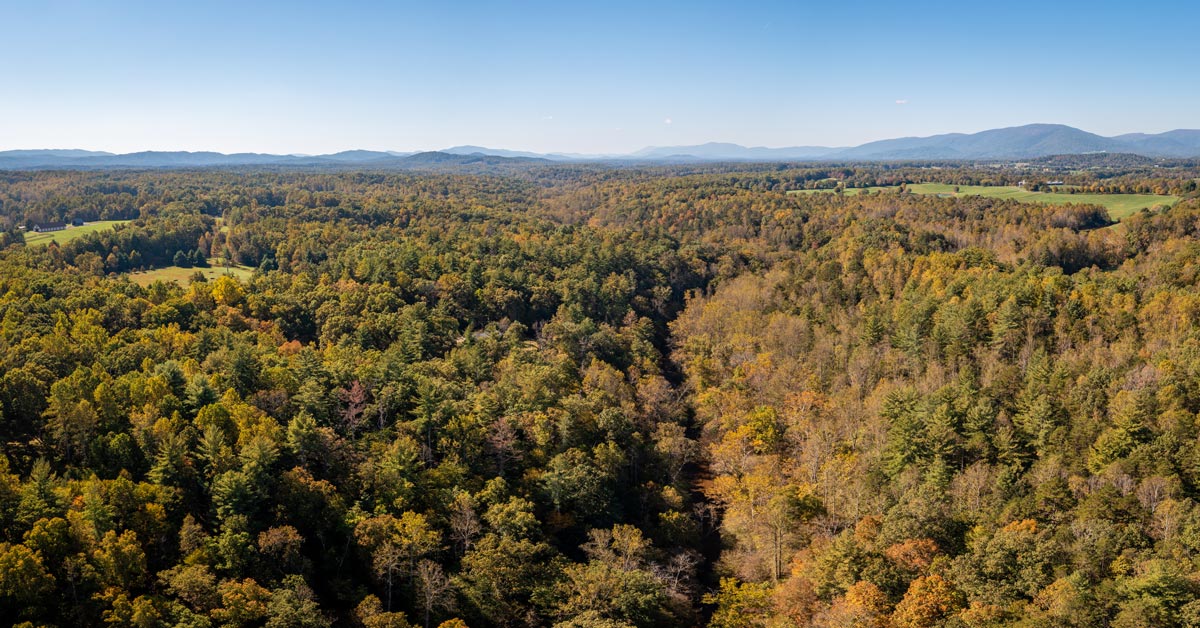The following text was sent out via email on November 10, 2022. Sign up for PEC email alerts →

Dear Supporter,
Like many of you, I love the fall for many reasons. Perhaps my favorite is the spectacular display of foliage throughout Albemarle County and the entire Piedmont region. The views of the Blue Ridge forests from Skyline Drive have been amazing this time of year.
The typical fall weather and scenic beauty of Albemarle’s designated Rural Areas bring many visitors from the County and Charlottesville, other parts of Virginia, and beyond. They come to experience our countryside, spending time hiking, biking, fishing and enjoying agricultural tourism opportunities.
In addition to the recreational opportunities and scenic experiences Rural Areas offer, Albemarle’s forests and woodlands—and farms, fields, lakes, rivers and streams—are critically important in reducing the impacts of climate change.
As the County adopts a new Growth Management Policy, PEC is urging County leaders to direct growth into existing Development Areas in order to protect and enhance natural resources in the Rural Areas for the benefit of all.
Climate benefits of Rural Area conservation
In 2018, in support of the County’sGreenhouse Gas Emission Inventory Report, the County calculated that from 2008-2016, the forests and tree cover throughout the Rural Areas and Developed Areas removed the equivalent of 945,732 metric tons of carbon dioxide on an annual basis. The report also estimated the County’s total annual greenhouse gas emissions in 2018 to be 1,419,367 equivalent metric tons of carbon dioxide. This means that our urban and rural forests and tree canopy help offset emissions by 66% – making them essential resources for our community as we address current climate impacts and prepare for the near and far future under climate change.
Though the County retains substantial forest areas, the County has calculated that between 2008 and 2016 it lost approximately 600 acres of forest. Community members have acknowledged during recent public engagement initiatives that the current and past growth management policies have generally worked to protect the natural resources of the Rural Areas. But given the critical role of natural resources in mitigating climate impacts, we need policies that result in the protection of tree cover and forest health specifically.
According to the County’s Preparing for Resilience, An Overview of Albemarle County Climate Impacts from the Climate Vulnerability and Risk Assessment, the County will become hotter and drier, with extended periods of drought. The County will experience more intense storms including increased flooding. And we will see increases in pests that will impact vegetation.
Forests, woodlands, and tree cover provide numerous benefits that can offset these impacts, like carbon sequestration, supporting biodiversity, nutrient cycling, water and air filtering, mitigating heat island effects and flood and erosion control. As climate change worsens, the need for these ecosystem services will intensify.
According to research by The Nature Conservancy published in the Proceedings of the National Academy of Sciences, “nature-based solutions can provide up to 37% of the emission reductions needed by 2030 to keep global temperature increases under 2°C.”
Growth Management Policy
The County planning staff recently presented the draft Growth Management Policy, “Framework for an Equitable and Resilient Community,” to the Planning Commission and Board of Supervisors. This framework will inform a set of goals, objectives, and strategies for the development of the AC44 Comprehensive Plan, which is why it is so important the County gets it right.
One of PEC’s major growth management concerns is potential expansion of rural villages. PEC supports the preservation of the County’s historic villages, including adaptive reuse of historic buildings and structures. However, expanding existing villages and developing new villages could result in the loss of forested areas and tree cover as well as negative impacts to other natural resources. Our forests, wetlands and grasslands play a critical role in mitigating climate change. They also filter and recharge our water resources, provide wildlife habitat and afford recreational opportunities.
Share your thoughts to protect our Rural Areas
Now is a great window of opportunity to email the Planning Commission and Board of Supervisors and remind them of the importance of our Rural Area as a natural carbon sink and key defense against climate change.
On behalf of PEC, thank you, and I encourage you to learn more and get involved with the entire Comprehensive Plan update process by visiting engage.albemarle.org.
If you have any questions or concerns, please reach out!
Sincerely,
Rob McGinnis PLA FASLA
Senior Land Use Field Representative
Albemarle County and Greene County
rmcginnis@pecva.org
